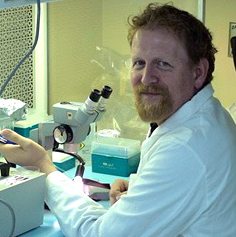Investigator Spotlight: April 2014

Ivan Gerling, PhD
Dr. Gerling is a professor at the University of Tennessee Health Science Center. Dr. Gerling joined nPOD in 2010.
-
Tell us about your education and background – where are you from, where did you go to school?
I was born in Copenhagen, Denmark, and got my initial research training and Ph.D. from the University of Copenhagen.
- Where do you currently work and what is your position? What does a “day in the life” look like for you?
I am currently a Professor of Medicine at University of Tennessee Health Science Center in Memphis. My job is 80 percent research, though I give a few lectures and have administrative responsibilities, such as arranging journal clubs and teaching conferences, as well as being a member of the Animal Care and Use Committee, which evaluated and approves all research projects involving the use of animals. On a typical day, I arrive at work at 7:30 am and begin the day with a cup of coffee, while talking with a friend and colleague from the office next door. The next hour or more is for dealing with emails. I prefer to write them right away, but for some, I put a note in my calendar: Take online course or write a letter for a former student. The rest of the morning is in the laboratory with the technicians, students and postdocs, helping to solve problems or answer questions that they have run into, or to plan for future experiments. After lunch, the rest of the day and early evening is spent in the office with administrative work. Most time-consuming is preparing for and writing grant proposals to fund the lab, as well as regulatory requirements. Those items have become increasingly more time-consuming, as grant funds have become less available. Less than 10 percent of grant applications get funded! As for regulatory, whole new organizations have been created for the sole purpose of oversight of the conduct of science.
- Why diabetes? How did you get involved in diabetes and/or what made you want to work in diabetes research?
Although I always wanted to do biomedical research, it was somewhat by chance that I ended up working with type 1 diabetes (T1D). In college, I ran into a friend who was a year ahead of me; he told me about this “great little diabetes research institute” where he was working on a project. I visited, got accepted, and the more I learned about autoimmune diabetes, the more interested I became. - Tell us about your research.
The JDRF-funded nPOD consortium has given researchers a unique opportunity to gain access to human organ donor tissue from individuals who have diabetes or belong to “at risk” populations. We have developed new protocols that allow us to obtain islets of Langerhans from frozen pancreas tissue blocks, and in one simple procedure, determine which genes are expressed and how each gene is expressed. Our studies compare islet gene expression in samples from organ donors with diabetes, without diabetes but at risk (with autoantibodies), or not at risk (no autoantibodies). These studies can help define individual genes, or pathways of genes, that are associated with the development or risk of development of diabetes. The goal is to use the knowledge to develop new drugs to target the specific genes and pathways that are associated with the progression of T1D so that we can stop the process. -
What are your thoughts on the progress being made in T1D research as a whole?
I have been doing research on T1D for over thirty years, I have been part of, and observing, a steady progress in our understanding of this disease. However, I have also seen an increasing impatience and rush to convert new insights into clinical trials. We have a large deficiency in our basic understandings of the genetics, environmental and molecular processes leading to the pathology of T1D. As a result, some clinical trials have poorly-supported assumptions, rather than solid knowledge. When large sums of money are invested into a failed clinical trial that was based on an incompletely developed concept, then that money is wasted. Given that funding of research projects is a zero sum game, it also means that there is no money to fully develop the basic science concepts and protocols that would increase the chances of successful clinical trials.
- Why is diabetes research so important?
Diabetes has been increasing at an alarming rate all over the world. Considering the cost in human suffering and money, we have no choice but to find a way to stop this terrible disease. The best chance of stopping T1D is by developing a complete understanding of why and how it develops — this is what research can and will do. - Do you have anything extra you would like to share? Is there anyone to thank or acknowledge?
I would like to thank the people who donate time and money to help fund more research. There is so much more we need to know. Large numbers of great research projects and new ideas remain unfunded, and therefore, unexplored. JDRF has been a crucial, positive force in the attempt to get more funding in diabetes research. JDRF is also important, not just with the substantial funds it directly raises, but also in its ability to influence government and other private funding sources to focus their attention on T1D. - When you’re not working, what do you like to do for fun?
I have always loved nature, and get out to enjoy it when time allows. If I have a good block of time, I try to take my family out skiing or hiking, depending on the season. If I can find just an hour or two, then we get the bikes out to one of the trails near where we live.
